Solar Batteries & Storage
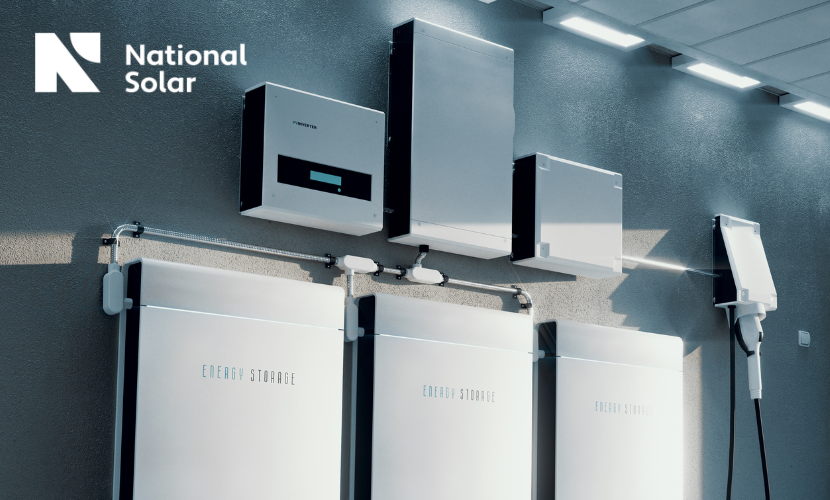
Solar Batteries & Energy Storage
Solar batteries store energy from your solar panels for use when the sun isn’t shining, providing backup power during outages and reducing reliance on the grid. At National Solar, we offer guidance on the types of solar batteries available, how to choose the right one, and the benefits they provide.
Solar Batteries: What You Need To Know
Solar batteries aren’t just a backup plan;
they’re an energy revolution in a box. By storing energy collected by solar panels, solar batteries empower you to:
- Keep the lights on when the grid goes dark
- Reduce your reliance on the grid and increase your energy independence
- Take advantage of time-of-use rates and save money on your electricity bill
- Use clean, renewable energy even when the sun isn’t shining
- Support a more sustainable and resilient energy system
From blackout protection to energy independence, solar batteries play a crucial role in your daily life, with battery capacity being a key factor. While homes connected to the grid might benefit from net metering and not need batteries, for others, they offer true energy independence. Whether you're on or off the grid, a solar battery can mean the difference between being vulnerable to the next power outage and being the one house on the block that never skips a beat.
Learning About Solar Storage Options
Navigating the world of solar battery storage can be complex and exciting. At National Solar, we understand that harnessing the full potential of your solar installation involves addressing questions about efficiency, lifespan, and savings. It's about more than just purchasing batteries; it's about designing a system that aligns seamlessly with your energy needs and personal values. Let us guide you through this journey to ensure your solar solution is perfectly tailored to your requirements.
With our expertise, we can help you understand the intricate dance between solar panels, the grid, and the batteries that store their energy.
Understanding Solar Batteries
So, what’s the secret behind solar batteries? Simply put, they’re the silent sentinels that store solar energy for when you need it most – be it during nighttime, power outages, or when the sun is playing hide and seek. Think of them as your personal energy reservoir, ready to spring into action whenever your solar panels take a break.
But it’s not just about having a backup. These battery backup systems are a bridge to energy independence, allowing you to use the energy you produce on your terms. Whether it’s a grid-tied system buffering against outages or a fully off-grid setup that breaks free from utility dependence, solar batteries are the key to turning your solar power system from a fair-weather friend into a reliable power source.
Types of Solar Batteries
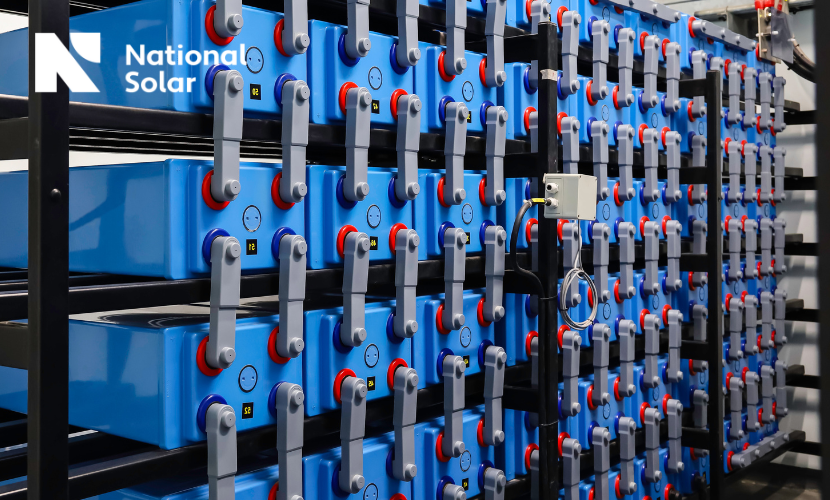
When it comes to choosing a solar battery, it’s not a one-size-fits-all scenario. There’s a variety of batteries available, each with its own set of perks and idiosyncrasies. Some options to consider include:
- Lithium-ion batteries: These are known for their high energy density, long lifespan, and fast charging capabilities.
- Lead-acid batteries: These are a more traditional option and are known for their affordability and reliability.
- Flow batteries: These batteries offer scalability and can be a good option for larger solar installations.
Lithium Ion Batteries
Lithium batteries, specifically lithium-ion and lithium iron phosphate batteries, are the crème de la crème of the solar battery world, boasting:
- High energy density
- Long, maintenance-free life
- Compact size
- Swift charge rates
- Longevity
While the upfront cost may raise eyebrows, investing in lithium-ion is a statement that you value performance and longevity in equal measure. With lithium iron phosphate technology, you can expect even greater benefits in terms of safety and durability.
But it’s not just about what they can do for you today. Lithium-ion batteries are a forward-thinking choice, as advancements in technology continue to improve their safety and extend their already impressive lifespans. When it comes to powering your home with the sun, they’re a bright spark in the solar battery space.
Lead Acid Batteries
Lead-acid batteries have been the stalwarts of energy storage for over a century, known for their affordability and wide availability. They’re the bread and butter of the battery world, offering a low-cost entry point for those looking to dip their toes into solar storage. However, these batteries come with a commitment to maintenance, especially if you opt for flooded lead acid batteries that require regular water level checks.
On the flip side, sealed lead-acid batteries, such as AGM and Gel types, offer a higher cost but reward you with a longer cycle life and minimal fuss. Regardless of the type, lead-acid batteries are best for those willing to invest time in maintenance for the sake of saving on upfront costs.
Flow Batteries
Flow batteries are the underdogs of the solar battery world, often overlooked for residential use, yet they have a unique superpower: scalability. With their large tanks of liquid electrolyte, they’re perfect for large-scale energy storage, making them a favorite for commercial applications. And while they might not be the go-to for your home today, they’re on the cusp of broader adoption, thanks to their remarkable longevity.
One of the hallmarks of flow batteries is their
ability to maintain capacity over time without degradation, which is a significant advantage for long-term energy storage solutions. As technology progresses, we might soon see flow batteries becoming a more common choice for:
- Homes seeking the ultimate in energy resilience
- Commercial buildings looking to reduce their reliance on the grid
- Renewable energy projects that need reliable storage options
Flow batteries offer a promising solution for these applications and could play a key role in the future of energy storage.
Sizing Your Solar Battery System
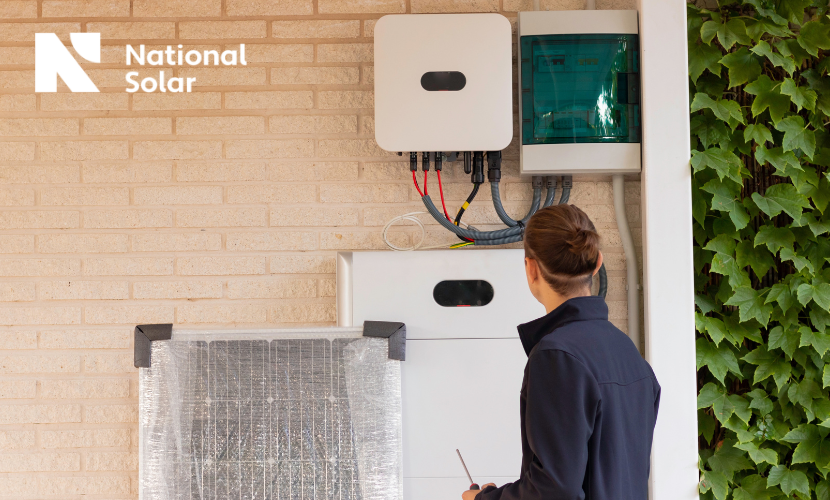
Choosing the right size for your solar battery bank is as important as selecting the battery type itself. An undersized system might leave you without power when you need it, while an oversized one could be unnecessarily expensive. At National Solar, we help you find the sweet spot where your energy needs align with maximum efficiency, all without straining your budget.
To size your system properly, you’ll need to take a good look at your daily electricity usage, the output of your solar panels, and the depth of discharge your batteries can handle. It’s a game of numbers and a dash of foresight, ensuring your system can handle your current needs while leaving room for the future.
Installation and Setup of Solar Batteries
While the DIY spirit is admirable, installing solar batteries is best left to professionals. This ensures safety, compliance with local regulations, and keeps your warranties intact. Additionally, correctly sizing your battery bank to match your solar panels is a complex task that requires expert knowledge. At National Solar, we handle all these details to protect your investment and ensure optimal performance.
The costs of installation can vary, but they’re a critical part of the journey to solar energy storage. Think of it as investing in peace of mind – knowing that your system is set up for optimal performance and longevity. And with the potential for additional components like inverters and charge controllers, it’s clear that professional installation is the way to go for a seamless solar experience.
Maintaining Your Solar Battery System
Once your solar batteries are up and running, a little TLC can go a long way in extending their service life. For lithium-ion batteries, this means avoiding long periods of inactivity and keeping an eye on their charge status. Regular checks and balanced charge levels will ensure they keep on ticking with maximum efficiency.
Lead-acid batteries, on the other hand, demand a more hands-on approach. Regular maintenance, such as checking water levels and ensuring proper ventilation, can prevent premature degradation and ensure they live out their expected lifespan. Each battery type has its own maintenance needs, but with the right care, you can maximize both performance and longevity.
Lifespan and Warranties
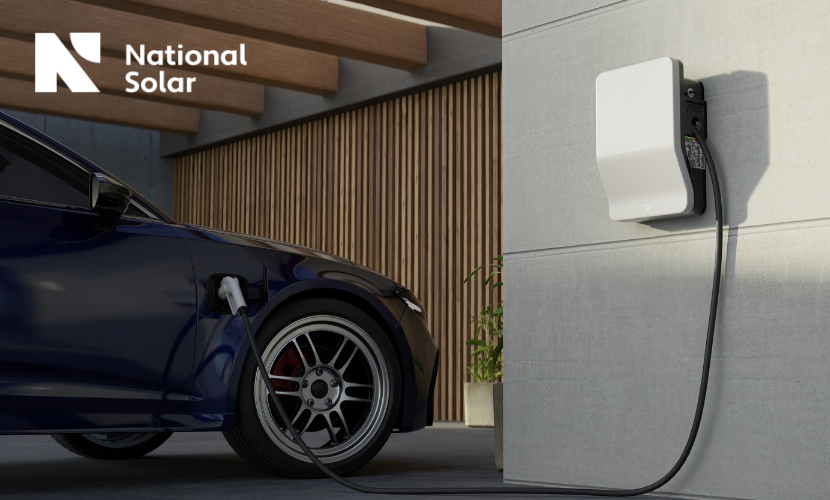
Every solar battery story has an ending, but with proper care, it can be a long and prosperous one. Here are the typical lifespans of different types of batteries:
- Lithium-ion batteries: can serve you loyally for over a decade
- Lead-acid batteries: typically ask for a replacement after about five years
- Flow batteries: promise an impressive 30-year lifespan
Warranties provide crucial protection against unexpected declines in performance. Many solar batteries come with a 10-year warranty, ensuring they maintain a significant percentage of their capacity over time. This promise of quality and reliability underscores the value of your investment with National Solar.
Inverters and Their Role in Solar Battery Systems
The unsung heroes of the solar power world are the inverters, deftly converting the DC electricity from your panels into usable AC power. They’re the bridge between the energy you harvest and the energy you use, ensuring every electron counts. With smart technology integrated into modern inverters, they also offer a window into the performance of your system, helping you manage your energy with precision.
Whether it's a standalone or hybrid inverter, these devices play a crucial role in your solar battery system. They ensure that the energy stored in your batteries is ready for use in your home or for feeding back into the grid, maximizing your system's efficiency and enhancing your energy independence.
Benefits of Solar Battery Storage
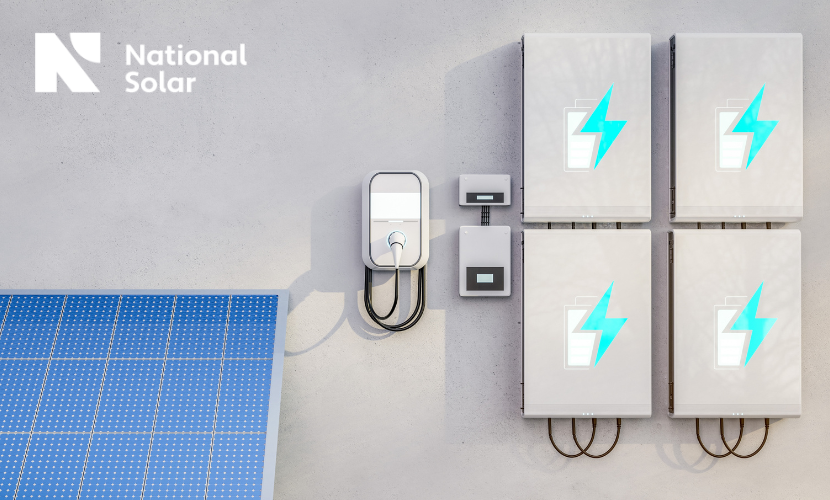
The perks of adding a solar battery to your system are as bright as the sun itself. Here are some of the benefits:
- Energy independence: You can keep your home powered during outages or reduce your reliance on the grid.
- Quiet operation: Solar batteries are much quieter compared to generators.
- Boost in property value: Installing solar battery storage can increase the value of your property.
- Environmental benefits: Solar power is a clean and renewable energy source, reducing your carbon footprint.
Solar batteries also make financial sense. By storing excess energy that would otherwise go to waste, they can help you reduce your energy bills over time. With significant savings on monthly utility bills, the return on investment for solar batteries can be as satisfying as the clean energy they provide. At National Solar, we ensure you get the most out of your investment.
Common Myths About Solar Batteries
Let’s clear the air on some common misconceptions about solar batteries. No, they’re not the inefficient, costly beasts of burden they’re sometimes made out to be. Thanks to modern technology, solar batteries are more efficient and accessible than ever before, breaking down the barriers to clean energy storage.
It’s time to leave outdated beliefs in the dust and embrace the reality: solar batteries are a smart, sustainable choice for anyone looking to take control of their energy future. With each technological leap, they become more capable and cost-effective, paving the way for a brighter tomorrow.
Energy Storage and Off-Grid Living
For the adventurers and the self-reliant, solar battery storage is the cornerstone of off-grid living. It’s about more than just cutting ties with the power grid; it’s about embracing a lifestyle powered by renewable energy. Whether you’re powering a remote cabin or a roaming RV, solar batteries ensure that your lights stay on and your carbon footprint stays low.
The costs of setting up an off grid solar system can vary, but the freedom it offers is priceless. With a well-sized battery bank, your solar panels can keep you powered through the night and beyond, making self-sufficiency an achievable dream.
Environmental Impact of Solar Batteries
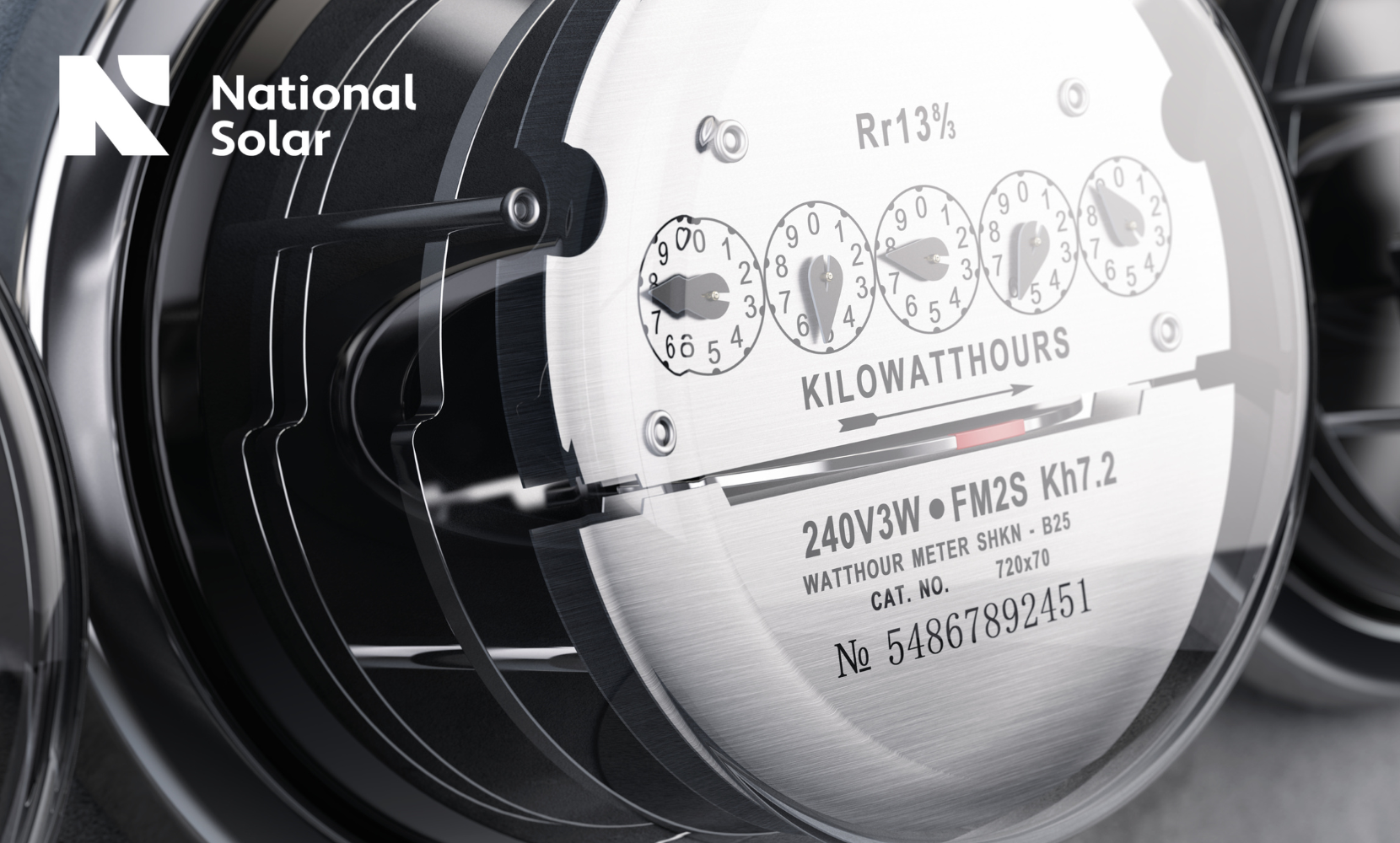
Solar batteries contribute to energy independence and have a profound impact on our planet. By enabling the storage of clean energy, they reduce our reliance on fossil fuels and lower greenhouse gas emissions. However, it’s important to acknowledge that their production involves environmental costs, including the mining of rare earth metals and the energy consumed in manufacturing. At National Solar, we strive to balance these impacts, ensuring a sustainable and responsible approach to clean energy.
However, the tide is turning. Innovations in materials and manufacturing processes are making solar battery production more sustainable. And when it comes to disposal, being mindful of the impact of toxic chemicals is crucial for preserving our environment for future generations.
Cost Considerations and Incentives
When you’re thinking about going solar, the dollar signs can seem daunting at first glance. But it’s essential to look beyond the initial sticker shock to understand the true cost of a solar battery system. From the battery itself to installation and maintenance, each element plays a role in the overall investment. Yet, with costs for solar battery storage continuously decreasing, storing your solar energy is becoming an increasingly affordable option.
Thankfully, financial incentives can lighten the load. In various regions, homeowners can take advantage of tax credits, rebates, and loans designed to make solar power systems, including solar battery systems, more accessible. Programs like the Canada Greener Homes Loan can significantly offset the upfront costs, making it even more appealing to embrace solar energy with National Solar.
How Many Solar Batteries Do You Need?
One of the burning questions when setting up a solar battery system is:
How many do I need? The answer isn’t straightforward—it’s a personalized equation that depends on:
- Your daily energy consumption
- How much power you want to have on hand
- Your goals, whether that’s simply to keep a few lights on during an outage or to achieve complete energy self-sufficiency.
Generally, a single solar battery is sufficient for emergency backup power, while two to three batteries are often enough to significantly reduce reliance on the grid for daily use. If you’re aiming for off-grid living, your needs will increase, and it’s not uncommon to require a dozen or more batteries to create a robust, self-sustaining energy system.
Safety and Best Practices
Safety should always be at the forefront when dealing with solar batteries. Proper handling and installation are critical to ensuring your system operates at maximum efficiency and avoids potential hazards. This means suiting up in protective gear, using insulated tools, and following all recommended safety protocols. Proper storage and adequate ventilation are also key to preventing accidents and extending the life of your batteries.
Adhering to best practices includes ensuring legal and regulatory compliance. Making sure your solar battery system meets all local and national standards is crucial for the longevity and efficiency of your investment. By following these guidelines, you're not only protecting yourself but also supporting the broader movement toward a sustainable energy future with National Solar.
How Many Solar Batteries Do You Need?
As we’ve journeyed through the ins and outs of solar batteries, it’s clear that they’re a linchpin in the quest for clean, independent energy. From lithium-ion’s longevity to lead-acid’s affordability and the potential of flow batteries, the right choice can illuminate your path to a sustainable lifestyle. Ensuring proper sizing, installation, and maintenance will maximize the benefits and lifespan of your solar battery system.
Embrace the future with confidence, knowing that with the right solar battery storage solution from National Solar, you’re investing in reliability, resilience, and a brighter tomorrow. Let the sun power your dreams, and let our solar batteries store the promise of a greener, more energy-independent world.
Frequently Asked Questions
Do I need a solar battery if my home is connected to the grid?
A solar battery isn't required if your home is connected to the grid, but it can offer energy independence and backup power during outages.
How do lithium-ion batteries compare to lead-acid batteries?
Lithium-ion batteries have higher energy density and longer lifespan than lead-acid batteries, but they are more expensive to purchase initially. Consider the long-term benefits when making your decision on which type of battery to use.
Can solar batteries reduce my energy bills?
Yes, solar batteries can reduce your energy bills by storing excess solar energy for later use, leading to significant savings over time.
How often should I maintain my solar battery system?
You should maintain your solar battery system based on the battery type; lithium-ion batteries need minimal maintenance, while lead-acid batteries need regular checks and servicing. Choose the maintenance frequency according to your battery type to ensure its optimal performance.
Are there financial incentives available for installing a solar battery system?
Yes, there are financial incentives such as tax credits, rebates, and loans available in many regions to offset the costs of installing a solar battery system and promote clean energy adoption.
Ready To Start?
Get A FREE Solar Quote
Make an Appointment
We Are Here To Help!
Get in touch with us
If you have any questions about our services, are interested in installing new solar panels, or require maintenance on an existing system, National Solar is here to help. Please reach out to us through our contact form, or give us a call at your convenience. We are dedicated to providing you with prompt and attentive service to address all your solar energy needs.
Call Us:
Free 403-800-9015


